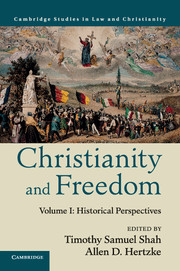Crossref Citations
This Book has been
cited by the following publications. This list is generated based on data provided by Crossref.
Philpott, Daniel
and
Samuel Shah, Timothy
2016.
IN DEFENSE OF RELIGIOUS FREEDOM: NEW CRITICS OF A BELEAGUERED HUMAN RIGHT.
Journal of Law and Religion,
Vol. 31,
Issue. 3,
p.
380.
2018.
SEPTEMBER 2018 BOOKS RECEIVED.
Church History,
Vol. 87,
Issue. 3,
p.
974.
Woodberry, Robert D.
Smith, Christian
and
Scheitle, Christopher P.
2019.
The Wiley Blackwell Companion to Sociology.
p.
224.
Witte, Jr., John
2019.
Church, State, and Family.
Trigg, Roger
2019.
The International Encyclopedia of Ethics.
p.
1.
Deagon, Alex
2019.
RECONCILING JOHN MILBANK AND RELIGIOUS FREEDOM: “LIBERALISM” THROUGH LOVE.
Journal of Law and Religion,
Vol. 34,
Issue. 2,
p.
183.
Rist, John M.
2019.
What is a Person?.
Patterson, Eric
and
Fitschen, Malcolm
2021.
Obama’s sustainable democracy promotion: assessing 7 years of policy performance.
International Politics,
Vol. 58,
Issue. 1,
p.
90.
Shah, Timothy Samuel
and
Taylor, C. Holland
2021.
The “Ashoka Approach” and Indonesian Leadership in the Movement for Pluralist Re-Awakening in South and Southeast Asia.
The Review of Faith & International Affairs,
Vol. 19,
Issue. 2,
p.
56.
Hertzke, Allen D.
2021.
The Radical Christian Witness of Daniel Philpott’s Scholarship.
The Review of Faith & International Affairs,
Vol. 19,
Issue. 4,
p.
30.





